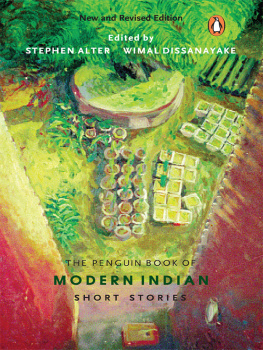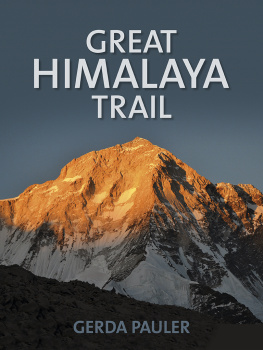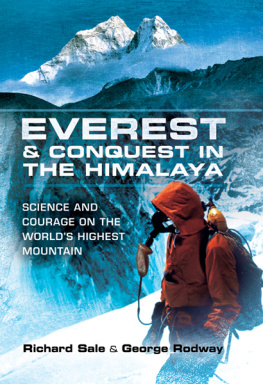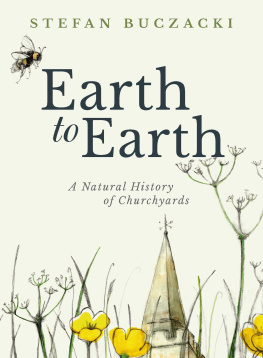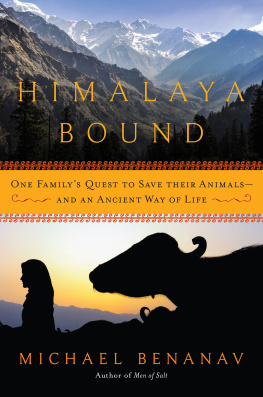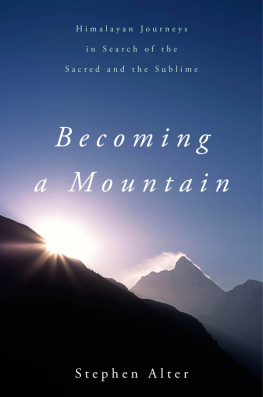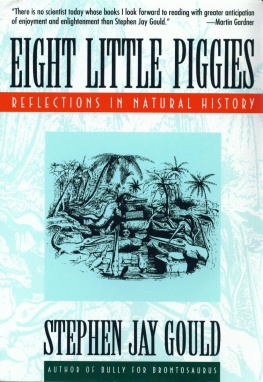Stephen Alter - Wild Himalaya: A Natural History of the Greatest Mountain Range on Earth
Here you can read online Stephen Alter - Wild Himalaya: A Natural History of the Greatest Mountain Range on Earth full text of the book (entire story) in english for free. Download pdf and epub, get meaning, cover and reviews about this ebook. year: 2019, publisher: Aleph Book Company, genre: Romance novel. Description of the work, (preface) as well as reviews are available. Best literature library LitArk.com created for fans of good reading and offers a wide selection of genres:
Romance novel
Science fiction
Adventure
Detective
Science
History
Home and family
Prose
Art
Politics
Computer
Non-fiction
Religion
Business
Children
Humor
Choose a favorite category and find really read worthwhile books. Enjoy immersion in the world of imagination, feel the emotions of the characters or learn something new for yourself, make an fascinating discovery.

- Book:Wild Himalaya: A Natural History of the Greatest Mountain Range on Earth
- Author:
- Publisher:Aleph Book Company
- Genre:
- Year:2019
- Rating:4 / 5
- Favourites:Add to favourites
- Your mark:
- 80
- 1
- 2
- 3
- 4
- 5
Wild Himalaya: A Natural History of the Greatest Mountain Range on Earth: summary, description and annotation
We offer to read an annotation, description, summary or preface (depends on what the author of the book "Wild Himalaya: A Natural History of the Greatest Mountain Range on Earth" wrote himself). If you haven't found the necessary information about the book — write in the comments, we will try to find it.
Stephen Alter: author's other books
Who wrote Wild Himalaya: A Natural History of the Greatest Mountain Range on Earth? Find out the surname, the name of the author of the book and a list of all author's works by series.
Wild Himalaya: A Natural History of the Greatest Mountain Range on Earth — read online for free the complete book (whole text) full work
Below is the text of the book, divided by pages. System saving the place of the last page read, allows you to conveniently read the book "Wild Himalaya: A Natural History of the Greatest Mountain Range on Earth" online for free, without having to search again every time where you left off. Put a bookmark, and you can go to the page where you finished reading at any time.
Font size:
Interval:
Bookmark:
WILD HIMALAYA
Also by Stephen Alter
NON-FICTION
Becoming a Mountain: Himalayan Journeys in Search of the Sacred and the Sublime
All the Way to Heaven: An American Boyhood in the Himalayas
Amritsar to Lahore: Crossing the Border Between India and Pakistan
Sacred Waters: A Pilgrimage to the Many Sources of the Ganga
Elephas Maximus: A Portrait of the Indian Elephant
Going For Take: The Making of Omkara and Other Encounters in Bollywood
FICTION
In the Jungles of the Night: A Novel About Jim Corbett
The Cloudfarers
The Secret Sanctuary
Neglected Lives
Silk and Steel
The Godchild
Renuka
Aripan and Other Stories
Aranyani
The Phantom Isles
Ghost Letters
The Rataban Betrayal
Guldaar


ALEPH BOOK COMPANY
An independent publishing firm
promoted by Rupa Publications India
First published in India in 2019
by Aleph Book Company
7/16 Ansari Road, Daryaganj
New Delhi 110 002
Copyright Stephen Alter 2019
All photographs are by the author.
All rights reserved.
The author has asserted his moral rights.
The views and opinions expressed in this book are the authors own and the facts are as reported by him, which have been verified to the extent possible, and the publishers are not in any way liable for the same.
No part of this publication may be reproduced, transmitted, or stored in a retrieval system, in any form or by any means, without permission in writing from Aleph Book Company.
ISBN: 978-93-88292-77-1
1 3 5 7 9 10 8 6 4 2
This book is sold subject to the condition that it shall not, by way of trade or otherwise, be lent, resold, hired out, or otherwise circulated without the publishers prior consent in any form of binding or cover other than that in which it is published.
Dedicated
to the memory of my parents
Ellen Stewart Alter
Robert Copley Alter
and to all those who work to protect and preserve the Himalaya

Long ago, before the earth or the sky was made, Zongma, who is the greatest of all, had two sons, Nipu and Nili.
Nipu and Nili were without form; they were not human beings, they were not animals, nor were they like the rocks. Many ages passed and then Nili made the earth and Nipu made the sky. When it was ready the earth was very big and Nipu put the sky like a lid above it. But the lid was too small and Nipu said, Brother, make the earth smaller so that the sky will fit it. So Nili pushed and pulled the soil together until the sky and earth were the same size, and as a result parts of the world stood up as mountains.
Bugun creation story, Arunachal Pradesh
From Myths of the North-East Frontier of India by Verrier Elwin
CONTENTS
AUTHORS NOTE
In previous books, I have used the spelling Himalayas because my editors insisted on popular usage, rather than Himalaya which is a traditional and more accurate transliteration of the Sanskrit proper noun. This may seem a small matter, and many readers will not even notice, but as most of the sources I quote use Himalaya, in deference to linguistic precedent, I have deleted the s, which might save a few millilitres of ink.

Prologue
OAKVILLE
Being at home in the Lower Himalaya, I often feel like an endemic species. Born in Landour, part of the larger town of Mussoorie, I continue to live here at 2,250 metres above sea level. Oakville, our family property, is where I sit and writemy benchmark and point of view. Living in the mountains shapes a persons perspective, gazing out across the valley below or back into the interior ranges, observing both the familiar and the unknown from the vantage point of home.
Situated on a spur at the eastern end of a forested ridge, Oakville almost seems part of the hill. Its corrugated sheet-metal roof, painted an earthen red, slopes upward to a peaked summit guarded by four stout chimneys. Chequered windows mirror a dense arcade of surrounding treesoaks, cedars, maples and rhododendrons. While the building was designed by a nineteenth-century military engineer it seems to reflect a blueprint of nature, an organic structure that rises out of the ground like some sort of geological formation or, perhaps, a giant anthill.
Between interlacing branches of deodar trees, the Gangetic plain is visible to the south, 2,000 metres below the elevation of the house. Ascending steeply to the west, the top of the hill rises 300 metres higher up. Just over a shoulder of the ridge, a panorama of Himalayan massifs, capped with snow and ice, appears along the northern horizon. Eastward lies a layered expanse of lower ranges, unfolding like the bellows on a vintage camera that might have been used to photograph this scene a century ago.
Whenever I am asked about Oakvilles history, I like to say the house was built in 1840, though there is no certainty to this date. Many of the earliest houses in Mussoorie and Landour came up around that time, when St. Pauls Church was consecrated. The first permanent construction was a shooting box built in 1825 by Captain Frederick Young, who settled here after fighting in the Gurkha War. A number of East India Company officials followed on his heels, visiting Mussoorie for leisure and sport when summer temperatures rose in the plains. In the 1830s a sanatorium and British military hospital for tropical diseases was established in Landour. The man who built Oakville was probably the garrison engineer, responsible for constructing the hospital and other cantonment facilities.
The original house burned down in October 1836. This story comes to us through John Pollocks Way to Glory, a biography of Major General Henry Havelock, KCB, the hero of Lucknow. Memorialized with a statue in Trafalgar Square, he has cities and towns named in his honour from New Zealand to the Andaman Islands. Havelocks wife, Hannah Marshman, was the daughter of Baptist missionaries in Serampore. During the spring of 1836, she came up to Landour with her three young children, a maid named Lucy, an ayah and several other servants. They rented Oakville for the summer season, while Havelock, a brevet captain at the time, was posted in Karnal. Hannah homeschooled her sons and took them for picnics on Pepperpot Hill. She also amused herself by collecting birds that she skinned and stuffed.
In those days, the Oakville roof would have been made of thatch gathered from grass-covered cliffs nearby. As the weather turned cold at the end of autumn, Havelocks family must have kept the fireplaces burning all day. One night, after they had gone to sleep, the thatch roof ignited with Hannah and her children trapped inside. The maid, Lucy, and the ayah both died, while the baby was fatally injured by a falling beam that fractured her skull. Plunging through flames and smoke, Hannah was able to rescue her two boys, though she was badly burned.
Next pageFont size:
Interval:
Bookmark:
Similar books «Wild Himalaya: A Natural History of the Greatest Mountain Range on Earth»
Look at similar books to Wild Himalaya: A Natural History of the Greatest Mountain Range on Earth. We have selected literature similar in name and meaning in the hope of providing readers with more options to find new, interesting, not yet read works.
Discussion, reviews of the book Wild Himalaya: A Natural History of the Greatest Mountain Range on Earth and just readers' own opinions. Leave your comments, write what you think about the work, its meaning or the main characters. Specify what exactly you liked and what you didn't like, and why you think so.

